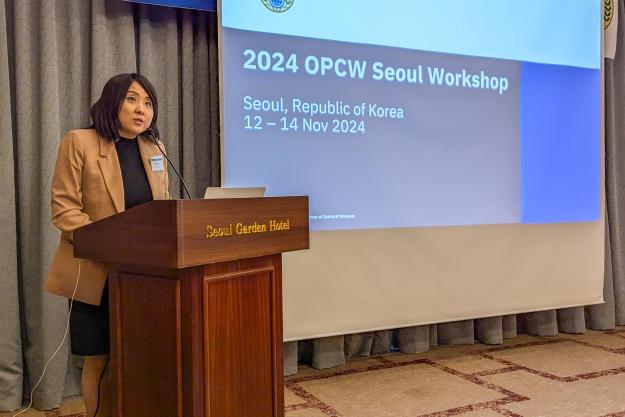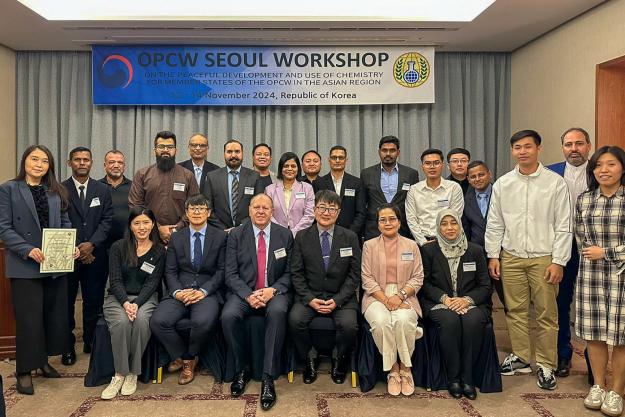The Organisation for the Prohibition of Chemical Weapons (OPCW) and the Republic of Korea organised the 13th edition of the Seoul Workshop on Peaceful Development and Use of Chemistry for OPCW Member States in the Asian region from 12 to 14 November 2024 in Seoul, Republic of Korea.
Asia has the largest regional chemical market in the world. The rapid expansion of Asia's chemical industry necessitates robust rules and regulations for handling chemicals to enhance chemical safety and security, promoting the peaceful uses of chemistry, ensuring environmental protection and safeguarding public health amid increased industrial activity.
The Seoul workshop addressed the specific capacity-building needs in chemical safety and security in the region. It promoted international cooperation initiatives focused on chemical industry outreach and the practical implementation of Article XI of the Chemical Weapons Convention (CWC). Discussions focused on key topics related to the peaceful uses of chemistry, including chemical safety and security management, drawing on the Republic of Korea's expertise in chemical technology and industrial innovation.

Ms Jiyoung Yun, Director of the Disarmament and Non-proliferation Division at the Ministry of Foreign Affairs of the Republic of Korea
At the opening of the event, Ms Jiyoung Yun, Director of the Disarmament and Non-proliferation Division at the Ministry of Foreign Affairs of the Republic of Korea, highlighted Korea's long-standing commitment to uphold the principles and objectives of the CWC. She emphasised that the workshop serves as an important forum to share best practices in preventing the re-emergence of chemical weapons in Asia, among other things.
"The workshop expanded my knowledge on new security-related technologies, ideas, and concepts to see the global threat of chemical weapons and highlight actions I can do as an individual and as a member of the chemical industry association in the Philippines," said Reinier Jay Bagabay, Quality and Environmental Manager at Pigmentex, Inc., a participant in the workshop.
"This workshop was very informative in terms of the hazards and risks related to chemicals, especially dual-use chemicals. I learned a lot not only from the presenters but also from the other participants with whom I had the chance to interact. My knowledge on chemical safety and security has increased manifold. Key learning points for me were how to detect any behavioural changes for any potential insider threat and how to enhance the control of chemicals," said Talal A. Adenwala, Senior Process Support Manager at Lotte Chemical Pakistan Ltd, a participant in the workshop.

Participants at the workshop on peaceful uses of chemistry
The course was attended by 23 participants from 16 OPCW Member States: Bhutan, Cambodia, India, Iran, Iraq, Kazakhstan, the Republic of Korea, Malaysia, Maldives, Nepal, Pakistan, Philippines, Qatar, Sri Lanka, United Arab Emirates, and Viet Nam.
Background
The Seoul Workshop on Peaceful Development and Use of Chemistry for Member States of the OPCW in the Asian Region is a long-standing course on the peaceful uses of chemistry fully funded by the Republic of Korea. Since its inception in 2012, the course has been continuously supporting capacity building in chemical safety and security management in Asian countries.
As the implementing body for the Chemical Weapons Convention, the OPCW, with its 193 Member States, oversees the global endeavour to permanently eliminate chemical weapons. Since the Convention's entry into force in 1997, it is the most successful disarmament treaty eliminating an entire class of weapons of mass destruction.
In 2023, the OPCW verified that all chemical weapons stockpiles declared by the 193 States Parties to the Chemical Weapons Convention since 1997 - totalling 72,304 metric tonnes of chemical agents - have been irreversibly destroyed under the OPCW's strict verification regime.
For its extensive efforts in eliminating chemical weapons, the OPCW received the 2013 Nobel Peace Prize.






